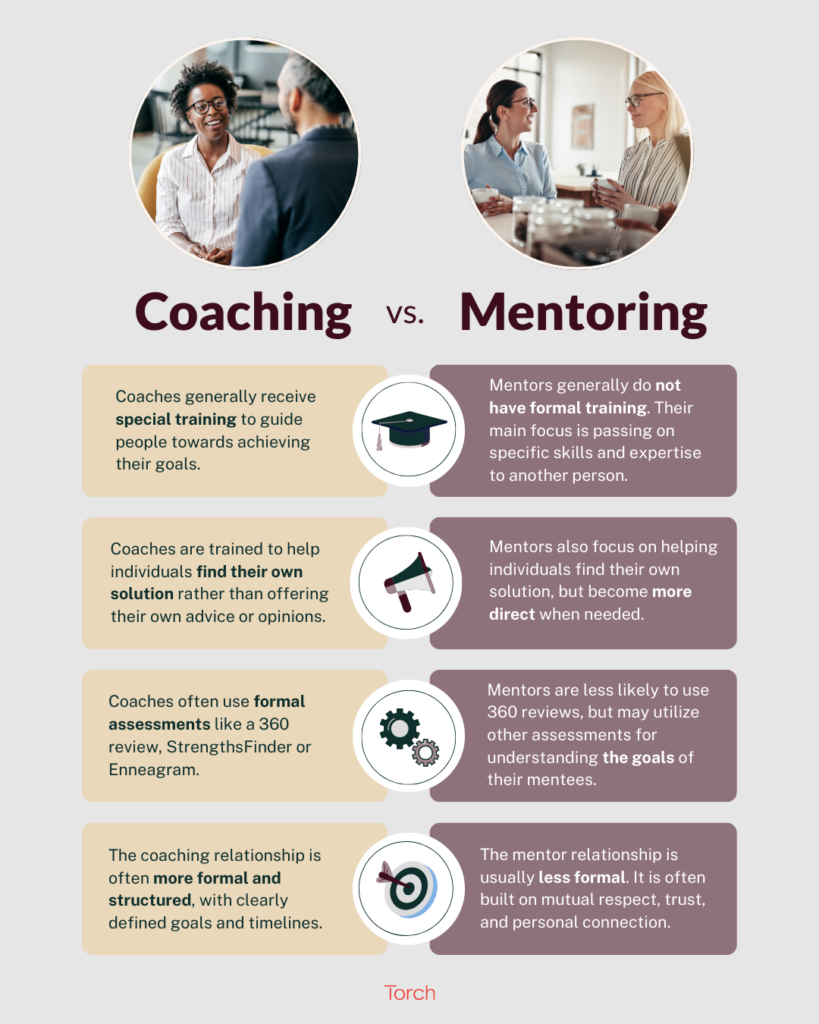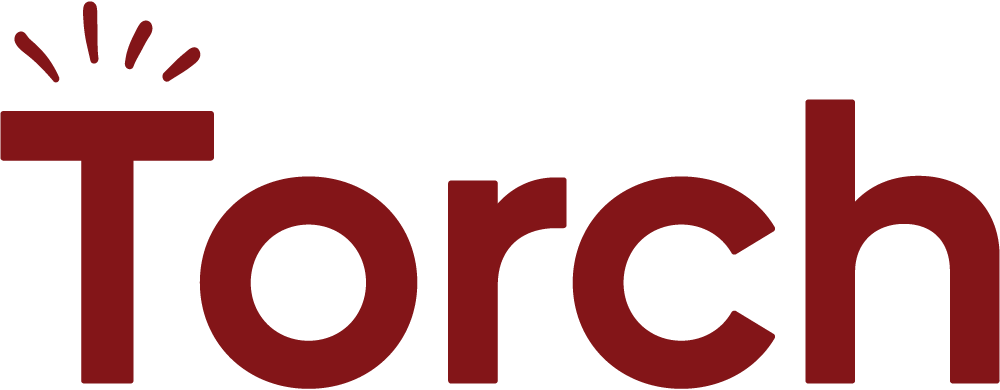We’ve found that coaching and mentoring are philosophically very similar. At the core of each practice is the relationship between two people. The methods might differ between coaching and mentoring, but both are about helping people get where they want to go by leveraging the experience of the coach or mentor.
In this article, we’ll explore what mentoring and coaching really are, the true differences between the two, how to know what your business needs, and how to get started with coaching, mentoring or both.

The definition of mentoring
We define mentoring as a development-focused relationship with a domain relevant mentor who passes on their skills and experience to a mentee.
Historically, a mentor is someone within the same company as the mentee, but in a more senior or tenured role. Nowadays, people often find mentors outside of their company through a professional network, and these people provide mentorship outside of their regular work duties.
The definition of coaching
We define coaching as a development-focused relationship with a specially trained coach who provides guidance to a client on their goals and helps them reach their full potential.
Typically a coach provides coaching as their full time job. They’ve often been trained by an organization like the International Coach Federation or Co-Active Training Institute. To create goals for the coaching relationship, they’ll often use an assessment, like a 360, to get a baseline for where to begin.
The (true) differences between coaching and mentoring
One of the reasons that the differences between coaching and mentoring are so often discussed is that there are no regulatory bodies for either that lay out these differentiators. Unlike say, getting a license to practice therapy, there is no governing body that decides who can be a coach or a mentor.
While we’re committed to the belief that coaching and mentoring are philosophically similar, what defines a coach and what defines a mentor can differ.
Below you’ll see categories that are typically used to differentiate coaches and mentors. For each, we’ve provided an explanation of how the team at Torch views these distinctions when it comes to our coaches and mentors.
Skills and training
Coaches: Generally receive special training to guide people in any field towards achieving their goals.
Mentors: Generally do not have formal training in mentorship. Their main focus is passing on specific skills and expertise to another person so they can be more successful.
Assessments and tools
Coaches: Often use formal assessments like a 360 review, StrengthsFinder or Enneagram.
Mentors: Less likely to use a formal assessment like a 360 review, but often utilize other assessments for understanding the goals of their mentees.
Conversational viewpoint
Coaches: Trained to help the individual find their own solution rather than offering their own advice or opinions
Mentors: Also are focused on helping an individual find their own solution, but become more direct when needed.
Domain expertise
While it can seem prudent to receive coaching or mentoring from someone who works in the same field, it’s not a necessity.
Short vs. long term focus
Both coaching and mentoring engagements can be short or long term.
We acknowledge that coaching has typically been seen as a short term engagement. In this engagement, a coach works with a client on specific goals, and when those goals have been achieved, the relationship is re-evaluated. However, there are many cases wherein a coach relationship does span the course of years, as people’s goals change over time.
We also acknowledge that mentoring has typically been seen as a longer term engagement. Mentors can work with a mentee over years, focusing on long term career development and goals. However, there are cases in which a mentor supports a mentee on a short term basis, for example, during their transition as a new manager.
Formality of engagement
We view coaching and mentoring as formal engagements between a coach/mentor and a client.
Most often the coaching relationship has been viewed as a more formal engagement. A specially trained coach has been sought to support a client. Mentoring, on the other hand, has often been viewed as informal. Mentors were found within a company, and the relationship would begin organically.
How to Build a Coaching Strategy: Chapter 1
Learn how to get the results you want from an investment in coaching.
Mentoring and coaching: What does my business need?
Now that we’ve explored how mentoring and coaching are similar, and how they differ, the next step is understanding when you’d utilize these services for your business. Here are a few common reasons you might consider coaching and mentoring. At the core of each of these is a focus on learning and development to increase retention and employee engagement.
You have high potential employees to develop and retain
Providing high potential employees with a dedicated coach or mentor gives them a resource devoted entirely to their development.
You have an existing development program that could be enhanced
Coaching and mentoring provide an important one-on-one component to any program focused on employee development.
You have new managers to train
If you’re planning to have a large cohort of new managers, bringing in new managers from a merger or acquisition, or perhaps just scaling rapidly, a coaching or mentoring program can help in different ways. If you have a strong group of leaders internally who can provide mentoring to new leaders, that’s a great start. If you need to provide more structure for a growing leadership team across the board, coaching is likely your next best step.
You are focused on succession planning
Providing a new leader with a coach or mentor during succession planning shows the employee that you are committed to their success.
You have a diversity and inclusion initiative you want to expand or begin
With coaches and mentors, you can focus on developing certain groups to create a more diverse and inclusive workplace. A coach or a mentor can often support the acquisition of strategic knowledge that is less accessible to historically underrepresented groups inside of organizations. Also, coaches and mentors often provide feedback that is harder for members of under-represented groups to obtain through standard feedback channels inside of organizations.
You want to increase employee engagement
Increasing opportunities for employee development through coaching and mentoring directly ties into how engaged employees feel at work. According to benchmarks from Culture Amp, learning and development is a consistent driver of employee engagement.
Getting started with coaching and mentoring
Starting a coaching program — and working to build a culture of coaching for your organization — ensures leadership development at scale. At Torch, we’re committed to providing organizations with the best coaching experience for their employees. We believe that focusing on individual growth not only empowers the individual, but also drives business growth.









